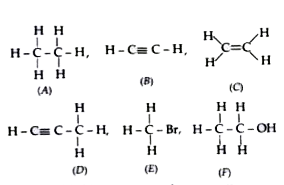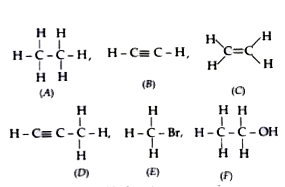Complete Solutions to Comprehension Type of chapter CARBON AND ITS COMPOUNDS of Class 10 book with complete answers and questions
| Class 10 | CHEMISTRY |
| Chapter | CARBON AND ITS COMPOUNDS |
| MTG IIT JEE FOUNDATION | Comprehension Type |
| Number Of Questions | 20 |
| Academic Year | 2023-24 |
PASSAGE-I : Diamond and graphite are two allotropic forms of carbon which are crystalline in nature. They differ physically but chemically they are similar. Diamond is the hardest crystalline form of carbon. In diamond each carbon atom is linked to four other carbon atoms by covalent bonds. In graphite, each carbon atom is linked to three other carbon atoms by covalent bond. Graphite is relatively soft and greasy. It is a good conductor or electricity.
Which of the following is a goos conductor of heat and electricity?
View SolutionPASSAGE-I : Diamond and graphite are two allotropic forms of carbon which are crystalline in nature. They differ physically but chemically they are similar. Diamond is the hardest crystalline form of carbon. In diamond each carbon atom is linked to four other carbon atoms by covalent bonds. In graphite, each carbon atom is linked to three other carbon atoms by covalent bond. Graphite is relatively soft and greasy. It is a good conductor or electricity.
Which of the folowing types of forces bind together the carbon atoms in diamond?
View SolutionPASSAGE-I : Diamond and graphite are two allotropic forms of carbon which are crystalline in nature. They differ physically but chemically they are similar. Diamond is the hardest crystalline form of carbon. In diamond each carbon atom is linked to four other carbon atoms by covalent bonds. In graphite, each carbon atom is linked to three other carbon atoms by covalent bond. Graphite is relatively soft and greasy. It is a good conductor or electricity.
Graphite is a good conductor of electricity because
View SolutionPASSAGE-I : Diamond and graphite are two allotropic forms of carbon which are crystalline in nature. They differ physically but chemically they are similar. Diamond is the hardest crystalline form of carbon. In diamond each carbon atom is linked to four other carbon atoms by covalent bonds. In graphite, each carbon atom is linked to three other carbon atoms by covalent bond. Graphite is relatively soft and greasy. It is a good conductor or electricity.
Which allotrope gives carbon dioxide on heating?
View SolutionPASSAGE-II : In all the organic compounds, the four valencies of carbon atom must be satisfied, either by single, double or triple bonds. It is not possible to get a compound in which the carbon atom has valencies either less or more than four. In these compounds carbon atoms can be linked together in the form of straight chains, branched chains or even ring chains.
In order to form branching, an organic compound must have a minimum of
View SolutionPASSAGE-II : In all the organic compounds, the four valencies of carbon atom must be satisfied, either by single, double or triple bonds. It is not possible to get a compound in which the carbon atom has valencies either less or more than four. In these compounds carbon atoms can be linked together in the form of straight chains, branched chains or even ring chains.
The number of `C-H` bonds in ethene `(C_(2)H_(4))` is
View SolutionPASSAGE-II : In all the organic compounds, the four valencies of carbon atom must be satisfied, either by single, double or triple bonds. It is not possible to get a compound in which the carbon atom has valencies either less or more than four. In these compounds carbon atoms can be linked together in the form of straight chains, branched chains or even ring chains.
The compound in which a double bond is present between two carbon atoms is
View SolutionPASSAGE-II : In all the organic compounds, the four valencies of carbon atom must be satisfied, either by single, double or triple bonds. It is not possible to get a compound in which the carbon atom has valencies either less or more than four. In these compounds carbon atoms can be linked together in the form of straight chains, branched chains or even ring chains.
Identify the unsaturated hydrocarbon.
View SolutionPASSAGE-III : Structural formmulae of some organic compounds are given :

The compound belonging to same homologous series are
View SolutionPASSAGE-III : Structural formmulae of some organic compounds are given :

Thwe structures which do not belong to hydrocarbons are
View SolutionPASSAGE-III : Structural formmulae of some organic compounds are given :

How can F be converted to C?
View SolutionPASSAGE-III : Structural formmulae of some organic compounds are given :

The compounds which can undergo addition reactions are
View SolutionPASSAGE-IV : A neutral organic compound A of molecular formula `C_(2)H_(6)O`, on oxidation with potassium dichromate and sulphuric acid gives an acidic compound B. The compound A reacts with B on warming in presence of conc. `H_(2)SO_(4)` to give a sweet smelling substance C. C on heating with D gives back A.
In the given reaction A is
View SolutionPASSAGE-IV : A neutral organic compound A of molecular formula `C_(2)H_(6)O`, on oxidation with potassium dichromate and sulphuric acid gives an acidic compound B. The compound A reacts with B on warming in presence of conc. `H_(2)SO_(4)` to give a sweet smelling substance C. C on heating with D gives back A.
In the above sequence of reactions compound B is
View SolutionA neutral organic compound A of molecular formula `C_(2)H_(6)O`, on oxidation with potassium dichromate and sulphuric acid gives an acidic compound B. The compound A reacts with B on warming in presence of conc. `H_(2)SO_(4)` to give a sweet smelling substance C. C on heating with D gives back A.
Compound C in the above reaction is
View SolutionPASSAGE-IV : A neutral organic compound A of molecular formula `C_(2)H_(6)O`, on oxidation with potassium dichromate and sulphuric acid gives an acidic compound B. The compound A reacts with B on warming in presence of conc. `H_(2)SO_(4)` to give a sweet smelling substance C. C on heating with D gives back A.
Identify the reagent D.
View SolutionPASSAGE-V :

In the above sequences of reaction A is
View SolutionPASSAGE-V :

The compound B is
View SolutionPASSAGE-V :

In the sequence of reaction C is
View SolutionPASSAGE-V :

The reagent D is
View Solution
Comprehension Type questions and complete solutions for chapter CARBON AND ITS COMPOUNDS of MTG IIT JEE FOUNDATION of Class 10
All Exercises from MTG IIT JEE FOUNDATION Class 10 CHEMISTRY CARBON AND ITS COMPOUNDS
- Assertion & Reaction Type
- Comprehension Type
- Exercise (Multiple Choice Questions) (LEVEL - 1)
- Exercise (Multiple Choice Questions) (LEVEL - 2)
- ILLUSTRATIONS
- Integer/Numerical Value Type
- Match the following
- NCERT Section
- Olympaid/HOTS Corner
- Solved Examples
- Subjective Problems (Long Answer Type)
- Subjective Problems (Short Answer Type)
- Subjective Problems (Very Short Answer Type)